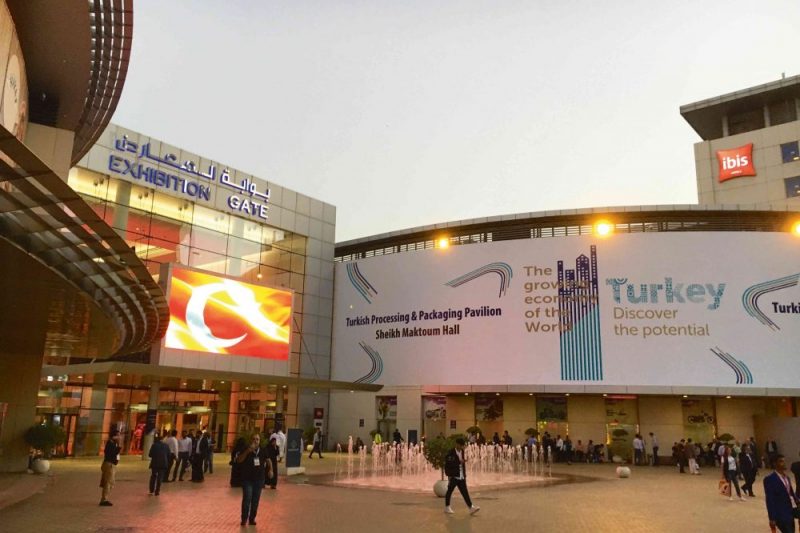Gulfood attracts a host of global manufacturing innovations

With a broad array of industry innovations on display, Gulfood Manufacturing revealed some significant developments for the confectionery and bakery sectors. Neill Barston reports
Delivering greater levels of equipment automation and creating flexible production techniques were among the critical topics of this year’s Gulfood Manufacturing event.
Organisers confirmed a total of 35,000 international visitors for the three-day event held last month at the Dubai World Trade Centre.
There were 1,600 exhibitors representing a total of 60 countries, with 30 national pavilions, including first-time participation from countries such as Poland and the Commonwealth of Independent States. The sector showcase explored a wealth of industry 4.0 technology themes, services and concepts geared to delivering greater efficiency for the Middle East market, covering packaging, automation, ingredients and processing developments. There were a wide range of exhibitors representing global confectionery and bakery markets, with equipment demonstrations, vibrant displays and technology tours forming key elements.
The Confectionery Production team made a welcome return as a media partner, with a broad spectrum of businesses confirming the trade fair had proved a significant success.
For its fifth edition, the event’s special features included sessions on subjects as wide-ranging as the use of artificial intelligence, blockchain and robotics; through to analysis of the Middle Eastern markets.

Trixie LohMirmand, senior vice president, exhibitions and events management, of organisers DWTC, said: “The show has huge industry appeal as it hosted a spread of international breakthrough technologies which are set to reshape a sector, which is racing to meet seismic changes in consumer demand and driving the 4th industrial revolution efficiency to heighten competitiveness.”
In addition, the trade fair hosted its Excellence Awards, that have been devised to celebrate innovation across the sector, as well as a FoodTech Summit, exploring key issues impacting on the region.
This included the rise of equipment efficiency, and trends such as addressing consumer demand for products featuring a greater level of natural ingredients. There were also finished product debut’s, including Barry Callebaut’s ruby chocolate series.

Equipment delivery
In terms of equipment developments, major global manufacturers exhibited with their upgraded machinery for the confectionery and bakery market.
This included Swiss-based Buhler, with the company showcasing its Snackfix system designed for cereal bars. The machine has a throughput of up to 130 kg/hr, dependent on product size, which has been devised to work in conjunction with other equipment in order to deliver enrobed products and extruded items.
Ritika Choudhary, marketing manager Middle East Africa confirmed the company’s presence had generated significant business leads. “I’m proud to say that is the first time that we have exhibited the Snackfix system on the stand here in Dubai, and it has gained a lot of interest and we have already made a sale from its presence here. It’s been a good event for us and we have noted the trend towards healthier snack options which our equipment can support,” explained the manager, who felt the quality and range of visitors had been high.German smart processing solutions provider GEA reported that the event proved invaluable in reaching new prospects. “Half way through the show we’d nearly met out targets,” noted Stefan de Roo, of the group.
Meanwhile, Michael Wolf, managing director of German-based Wolf Machines, explained that exhibiting at Gulfood was of critical importance to the business. The company, which has established a full range of confectionery production machinery, confirmed that 2018 had seen a record performance for the firm.
“Dubai is a melting pot, everyone likes to come here and enjoy themselves, and customers like visiting the city and the trade fair.
“The event has gone well for us, though we expected that there would be less business here this year, as taxes have been raised in the Emirates. But places like Syria are starting up again with manufacturing despite the war not being over there – that’s quite amazing. Historically, it has been a strong market within confectionery,” said Wolf.
He added: “The sales of our equipment do vary internationally – for example one year the market might be slower in Argentina, then the next it will be higher, which is why we need to trade on worldwide basis to comply with our projects.”
For its part, Theegarten-Pactec, the German packaging machinery specialist, presented its high performance EK4 model during the trade fair. The system can process up to 2,300 boiled sweets per minute in double-twist style, which has set a benchmark within the market segment. In addition, the company showcased its full range of packaging machinery, with its specialist focus on small wrapped confectionery items, which it is capable of wrapping in a diverse range of styles.
President and CEO of Theegarten-Pactec, Markus Rustler, said: “We have received a lot of customers – both planned appointments and people just dropping in on us. It seems that the show will be a successful one for us, as it has been previously.
“For Theegarten, Gulfood is after Interpack and ProSweets, the third most important show in the world – Dubai is a good hub for exhibitions as it is easy to reach from many countries, especially for customers locally, but also from Turkey, Iran, and almost all parts of Africa, which is what makes this event important to us.
“It’s good to be here and meeting customers, and this year we have displayed the EK4 as we did last year as it’s easy for us to exhibit and run with real products, and will be delivered on to a customer based in Dakar, Senegal.”
Other manufacturers, including UK-based BCH, found the show generated a notable level of commercial leads. The company’s team commented that its performance at the event had demonstrated the region’s comparative resilience. Stuart Grogan, the firm’s operations director, said Gulfood had been a ‘great event’ for the company, explaining that the business already had a strong order book as it moved into 2019, with a number of installation projects planned.
Within the bakery market, Erik Smink, of the Tromp Group enthused that Gulfood “had been an exciting exhibition to be at,” confirming that there had been some high-quality leads generated at the event.
He explained the business intends to place a strong emphasis on its pizza production equipment, which reflected the segment’s continued rise in popularity with consumers. With an ever-growing array of flavours and toppings, he said the company was well-placed to respond to international market demands.
Ingredients breakthrough
As colouring food business GNT highlighted, food and beverage manufacturers in the Middle East are behind other markets in production terms – with 88 per cent of coloured products launched in the region in 2017 containing additive colourants.
In response, the firm presented its Exberry colouring food series. Paul Collins, international director of sales, said: “We’ve been physically present in the region for the past three years, so for us, being here at the event is all part of that wider presence. We’re here to make lots of contacts, and I think the show is very good for that, though visitor numbers haven’t been quite at previous levels, but we believe we’ve put on a great display.”
Phil Witcomb, global marketing manager for Palsgaard, which specialises in emulsifiers applied across the food sector including confectionery and bakery, reported strong interest from visitors. He said: “Gulfood was a great success – we had around 100 high quality meetings with agents, distributors and clients from the region.
“We actually had visitors from over 21 different nations – by far the best represented were UAE, Saudi and Pakistan where we have valuable sales and an established client base.
“The greatest interest was regarding our dairy and bakery solutions – both areas of growth in these regions – and ideal applications for our emulsifier and stabiliser solutions. Overall, a very successful event for us, and a pleasure to be together with other Scandinavian suppliers on the Danish pavilion.”
As Sensient explained, the company has devised a range of Halal products and an extensive series of natural colours and colouring foods providing extended shelf life, high stability and strong performance. The business has also expanded its label friendly colour shades with Pistachio Green, based on algae chlorella. Due to its good heat stability, it achieves intense bright green shades, with low taste impact, in baked goods like muffins.
Other application areas include ice cream, extruded snack products, and breakfast cereals. It has also responded to global debate over the development of Titanium Dioxide alternatives (after key health concerns were raised), the company developed its Avalanche White series last year.
Another prominent series of innovations was demonstrated by Tate and Lyle, which was a finalist in the event’s excellence awards, for its Promitor Soluble Fibre used for reducing sugar within food ranges.

Senior product manager Tommy Lykke Husum, said: “Our appearance here is very much based around our Stevia portfolio, as well as our latest innovations in starches and fibres.
“Stevia has its place in the confectionery segment – it’s use is growing, and is seen within chocolate applications, though it’s penetration within the market has been limited due to older technology that has been applied with it in products.
“But we have moved on with Stevia in its second and third generation of applications, and consumers perhaps have yet to catch on that this is the case, so there is now real potential in terms of flavour profiles that are possible,” added the specialist on the event that provided an array of innovation across region’s food market, including confectionery sector



